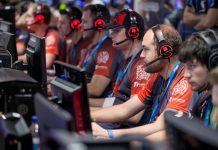For Bayes Esports CEO Martin Dachselt, it is essential to establish the key differences between esports and traditional sports when it comes to the use of data in betting markets.
It comes as the rise of esports and the increasing legalization of sports betting in the US are paving the way for new entrants in an esports betting market.
Speaking to SBC Media at SBC Summit North America 2021 at the Meadowlands in New Jersey, Dachselt detailed the intricate differences between esports and traditional sports that could cost operators if they do not adapt the data collection process.
He remarked: “There’s a fundamental difference between esports and traditional sports when it comes to data. So, for traditional sports, we have scouts who sit in the stadium or watch on TV. They plot events like goals, fouls, and successful passes. But you do not have as many data points or events in games and in eSports, we have hundreds of actions that can happen in 10 seconds.
“So it’s much faster and it’s virtually impossible to manually scout them. This is one of many reasons why official data affects the server, you can expect very high-quality data, lots of exact data points directly from the server.”
Warning operators on the dangers of using unofficial data sources, Dachselt pointed out that attempting to manually scout or use dubious sources of data can cost valuable seconds and potentially risk losing customers.
On using unofficial data, he noted: “You lose the data within a match. For example, if you do it from the broadcast, there’s advertising, there are analysts coming in so in these moments you lose from a couple of seconds up to half a minute of data.
“Secondly, they might see someone is taping data and create some mechanisms against that and you might need to look for a new source and during a world championship, you suddenly lose access to the data and lose a big part of your business. Much more importantly, your customers will be unhappy and everyone knows the cost of customer acquisition can be hundreds of dollars per person.”
Marking the entrance of Bayes Esports into the growing esports betting market in the US, the firm’s lead was eager to cite the conservative process it is undertaking. He noted that the firm is speaking to fantasy sports operators to establish the differences, given the difference in customer habits and demands in the US compared to Europe.
Dachselt commented on Bayes’ US expansion: “This is our first time in the US and we already have some customers in the US but we want to do it conservatively at first. We want to learn what matters in the US and this is a bit different from Europe.
“If you look at fantasy, it does not exist in Europe in that form but it is a big thing in the US. We need to understand what the fantasy providers need. What data do they need and what coverage do they need. So we are talking to them now and seeing what market players exist. We are checking the regulations as betting regulations are a big topic in the US and it’s not an easy topic as we all know.”
Dachselt earmarked the use of Bayes Esports data products in the esports betting market, noting that the quality of data sets them apart from other providers.
He concluded: “The USP of Bayes Esports is we are really focused on official live data. For our live data, we do not scrape data, we do not do manual scouting data or from dubious sources. We only sell data where we have official and most of the time exclusive distribution partnerships.”












